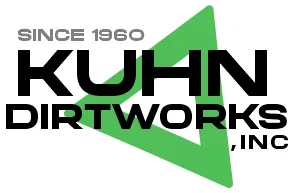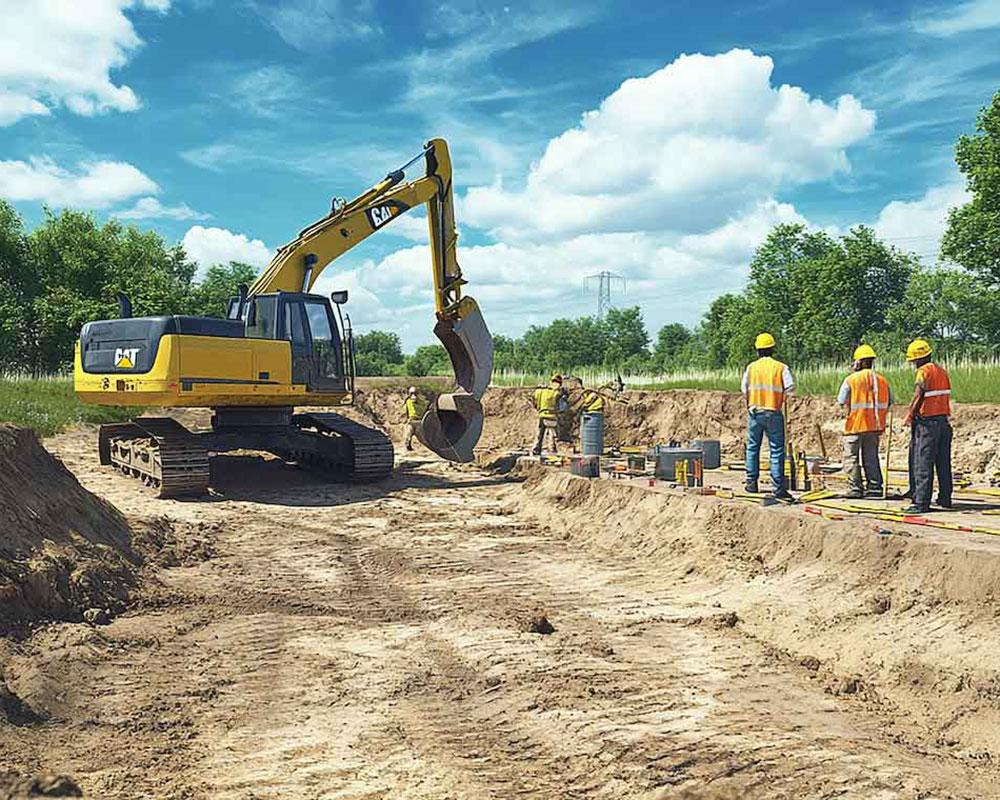
Serving IL & IN: Clark, Vigo, Edgar, Crawford, Sullivan, Clinton, Coles & Greene Counties
Blog

Breaking Ground Without Breaking the Bank: A Cost Guide to Full Site Preparation Near Terre Haute in Vigo County
What’s Full Site Prep, and Why Does It Feel So Overwhelming?
You’ve got the land. Maybe it’s family property passed down for generations. Maybe it’s something you’ve saved for and just bought outside of Terre Haute. Either way, you’re ready to build — a home, a shop, a barn, maybe even your dream business.
And then reality hits.
You start hearing terms like site prep, grading, excavation, and utility trenching. People throw out numbers that make your stomach turn. You want to move forward, but you’re worried. You don’t want to make a decision that could cost you more down the road — or worse, halt the whole project.
At Kuhn Dirtworks, Inc., we meet people in this exact situation all the time. You’re excited, but anxious. Hopeful, but cautious. And that makes perfect sense. Site prep is the first real money you’ll spend on your build, and it sets the tone for everything that follows.
We’ve written this guide to make things feel less confusing — and a lot more doable.
What Is Full Site Preparation and Why Is It So Important?
Full site preparation is exactly what it sounds like: getting your land ready to build on. It’s not one big job — it’s a bunch of small ones done in the right order.
Here’s what it usually includes:
Clearing the land of trees, stumps, brush, rocks, and debris
Grading to level the ground and create proper drainage
Excavating for a foundation, crawlspace, or basement
Trenching for water, sewer, power, and other utilities
Prepping driveways or pads so heavy equipment can get in
Without these steps, you risk foundation issues, water damage, and project delays. And trying to cut corners early on usually ends up costing more later.
Who Needs Full Site Prep Near Terre Haute?
Not every project needs full-blown site prep, but here are a few that almost always do:
New home builds on undeveloped land
Barndominiums or pole barn-style homes
Detached garages or shops
Agricultural buildings like livestock barns
Small business buildings going up outside of town
We serve homeowners, farmers, investors, and business owners across Vigo, Clark, Edgar, Crawford, and surrounding counties. Some lots are flat and already cleared. Others are full of brush and need serious work just to get started. Either way, we figure out what’s needed — and what isn’t — so you’re not paying for things you don’t need.
Step-by-Step: How Full Site Prep Actually Works
Let’s break this down into bite-sized pieces. Here’s how a typical project might flow.
1. Site Visit and Planning
We walk your property with you. We look at slopes, trees, access points, soil conditions, drainage, and what you want to build. Then we make a plan.
2. Land Clearing
Trees, brush, roots, and rocks all get removed. We haul away debris or burn it (depending on what local rules allow). This gives us a clean slate to work with.
3. Rough Grading
We shape the land to make sure water drains away from your future building. This isn’t about making everything flat — it’s about making it function.
4. Excavation
This step depends on what you’re building. It could be digging footings, a crawlspace, or a full basement. We also prep driveways and parking areas with gravel or stone.
5. Utility Trenches
We dig safe, code-compliant paths for water lines, electrical conduit, septic pipes, and more — whatever your project calls for.
Every site is different, but those steps are the backbone of most full site prep jobs in Vigo County and beyond.
Real Costs of Site Preparation in Vigo County
We know what you’re really wondering: What’s this going to cost me?
The answer: it depends. But here are some local averages to give you a starting point.
These numbers shift based on your property size, soil type, slope, tree coverage, and how close you are to town or utility hookups.
If you’re building on a wooded lot with soft soil and poor access, you’ll be toward the high end. If your land is open and level with easy road access, you could stay on the lower end.
What Affects the Cost of Site Work the Most?
We’ve seen projects go over budget because of a few big factors. Here are the ones that matter most.
1. Soil Conditions
Some soils are soft and wet, others are packed and rocky. The harder it is to dig or shape, the longer it takes — which costs more.
2. Trees and Stumps
Big hardwoods with deep roots take time to remove. And grinding stumps below grade adds to the labor.
3. Access to the Site
Can a truck drive up easily, or do we need to clear a temporary road first? Bad access = higher cost.
4. Weather and Drainage
If your lot holds water, we may need to haul in dry fill or build temporary ditches. We don’t fight nature — we work with it.
5. Changes During the Project
Every time someone says, “Hey, while you’re here…” it adds time and cost. Small changes add up fast.
How to Keep Your Site Prep Affordable Without Sacrificing Quality
Want to save money without doing something you’ll regret? Here are a few smart tips.
1. Plan Ahead
The earlier we’re involved, the better. A quick site visit can help us flag problems before they become problems.
2. Be Honest About Your Budget
We don’t upsell. If you’re working within a number, let us know — we’ll tell you what’s realistic and where you might be able to save.
3. Don’t Hire Based on the Lowest Price
The guy who charges half usually costs double in the end. We've been called in too many times to fix poor work that could have been done right the first time.
4. Bundle Services
It’s often cheaper to hire one crew to handle all your site work instead of piecing it out between several companies.
Avoid These Common Mistakes That Blow the Budget
We’ve seen a lot over the years. Here are a few things that trip people up time and time again.
Skipping the permit step
Vigo County requires permits for most grading and excavation work. Starting without one can delay or halt your build.Not accounting for the unexpected
Always pad your budget by 10–20%. That gives you room to handle surprises without panic.Ignoring drainage issues
Water problems don’t fix themselves. Proper grading and drainage might cost more now, but it’ll save you down the line.Overbuilding your foundation site
Bigger pads take more time, material, and labor. Build what you need — not more.
How Kuhn Dirtworks, Inc. Helps Homeowners Start Strong
We’re based in Marshall, IL, but we work all over — from Vigo and Clark County to Edgar, Coles, Sullivan, and beyond. We’re not a big operation, and we’re proud of that. It means we can focus on each job like it actually matters — because it does.
We don’t show up with a cookie-cutter plan. We walk your site. We ask what you want. And then we work backward from your goals and your budget to come up with a prep plan that makes sense.
Every site is different. Every homeowner is different. That’s why we customize everything we do — from how we dig to how we schedule.
Your Next Step: What to Do Before You Break Ground
Still unsure where to start? Here’s a simple checklist to get you moving in the right direction.
Site Prep Starter Checklist
Walk your site and mark out what you want to build
Check with the county about permits and zoning
Schedule a site visit with a local contractor
Ask for a detailed quote, not just a flat rate
Set aside a 10–20% cushion for surprise costs
Talk through drainage, access, and utilities ahead of time
Don’t rush — planning saves money later
Starting a new build doesn’t have to be a gamble. When your site is prepped right, the rest of your project goes smoother — and costs less in the long run.
If you’re near Terre Haute or anywhere in the counties we serve, we’d be happy to talk it through with you. No pressure, no jargon — just real answers.
